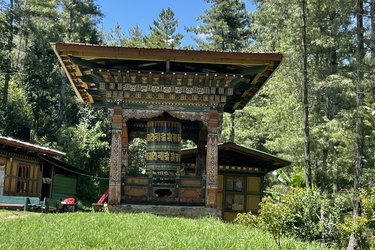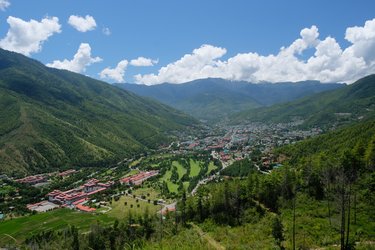
Bhutan stands as a remarkable example of how ancient wisdom can guide modern sustainability. This Himalayan kingdom has achieved what many nations aspire to: maintaining environmental integrity while pursuing development. At the heart of Bhutanese sustainability lies a philosophy where nature and humanity are deeply intertwined.
Unknown“True Wealth is not out of Pocket, but of the heart and the mind”
The practice of meditation serves as a spiritual and cultural cornerstone that fosters connection with oneself, others, and nature. The Bhutanese believe that connecting with all sentient beings and the natural world is essential to sustaining life itself. This mindfulness permeates everyday life, from largely organic agriculture and common vegetarianism to craftsmanship that prioritizes meaningful creation over mass production. The society's value system honours humility over pride, gentleness over violence, and kindness over cruelty, leading to respect for nature rather than attempts to conquer it.
Bhutan's constitution enshrines this environmental ethos, mandating that at least 60% of its land remain under forest cover for all time. Today, that figure stands at approximately 70%, far exceeding global benchmarks. The country has achieved carbon neutrality, absorbing over nine million tonnes of carbon annually. Its development philosophy, Gross National Happiness (GNH), introduced in the 1970s by His Majesty the Fourth King, prioritizes holistic well-being over material wealth, balancing economic progress with cultural preservation and environmental integrity.
Social relationships are equally intertwined with environmental stewardship. The use of natural resources is governed not by rigid laws but through collective community responsibility woven into the social fabric. Protected areas, including sacred mountains that serve as biodiversity sanctuaries, are preserved through cultural norms reinforced by legal mandates.
Today, Bhutan’s rivers run clear even during the monsoon, revealing pebbles on their beds, a visual metaphor for the country’s clarity of purpose. This is not just environmental policy. It is a moral commitment to future generations.

Bhutan’s journey toward sustainability is inspiring—but it’s not without peril. Bhutan faces significant challenges as it transitions from Least Developed Country status to middle-income status. Climate risks now strike harder and deeper. Behind the postcard-perfect landscapes, a quiet crisis brews.
Glacial melts and erratic rainfall are no longer rare, they’re recurring threats. Floods tear through downstream communities, erode infrastructure, and disrupt livelihoods. Agriculture, the lifeblood of rural Bhutan and largely driven by women who make up 58% of the sector, is especially vulnerable.
Climate shocks here don’t just damage crops; they deepen inequalities and expose the fragility of entire communities. This time the threat is not from invading armies nor is it unchecked resource exploitation – Bhutan’s has long kept these in check. This threat is invisible, creeping in through the very air and it’s rewriting the rules of survival.

As one of six Front Runner Countries for LIFE-AR, Bhutan has joined an LDC-led initiative that operationalizes the LDC vision 2050 to build long-term climate resilience. The country has designed a community-driven implementation pathway to deliver transformative change through what is referred to as a "delivery mechanism."
The approach moves beyond fragmented projects to a programmatic model that is participatory, flexible, and nationally owned. Communities select and prioritize investments, control resources, and monitor progress on their own terms —a practice that aligns with centuries-old Bhutanese traditions.
As the final quarter of 2025 approaches, Bhutan will begin piloting this mechanism, testing solutions and joining forces with other initiatives to form a community of practice—a philosophy rooted in Bhutan’s ancient wisdom.
Bhutan's experience demonstrates that true progress lies not in conquering nature but in coexisting with it, guided by values that prioritize harmony, compassion, and collective well-being. The country's approach to climate resilience through LIFE-AR represents an evolution of its time-tested philosophy of balance between development and environmental preservation.